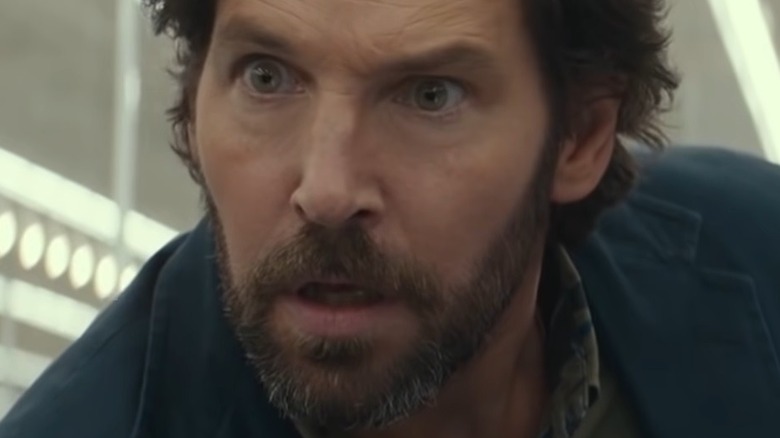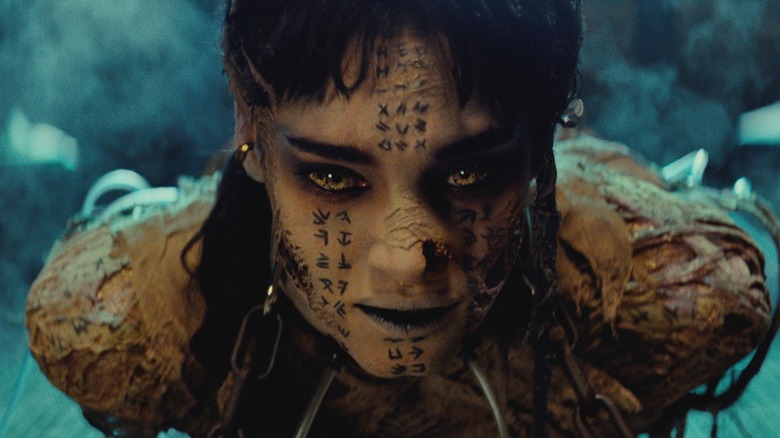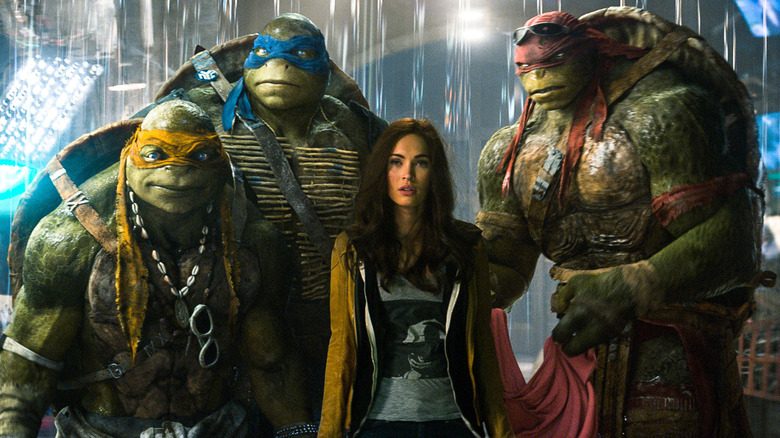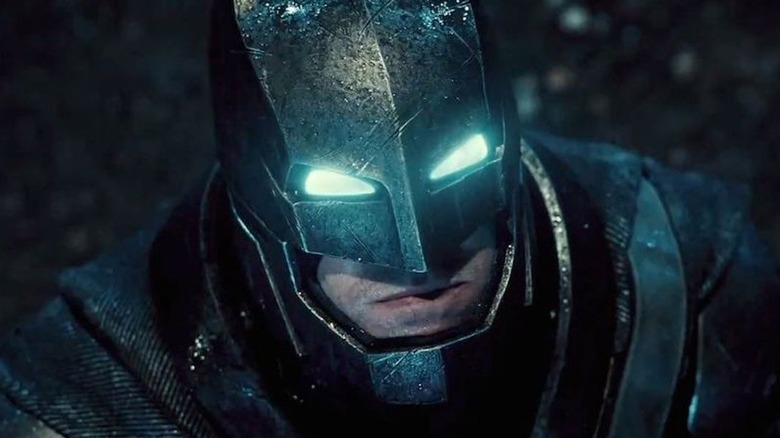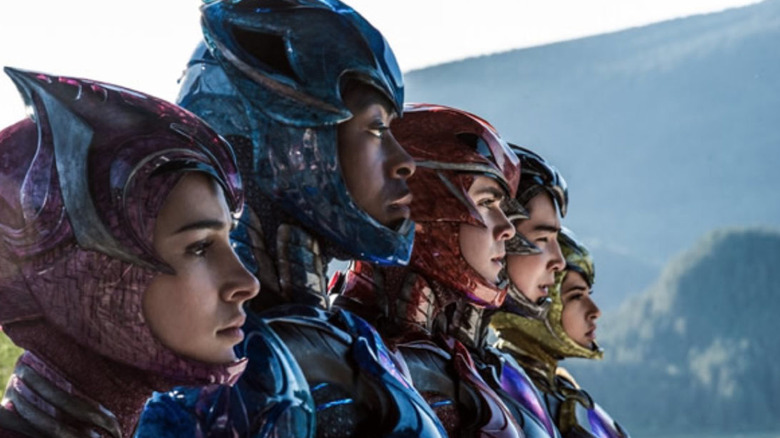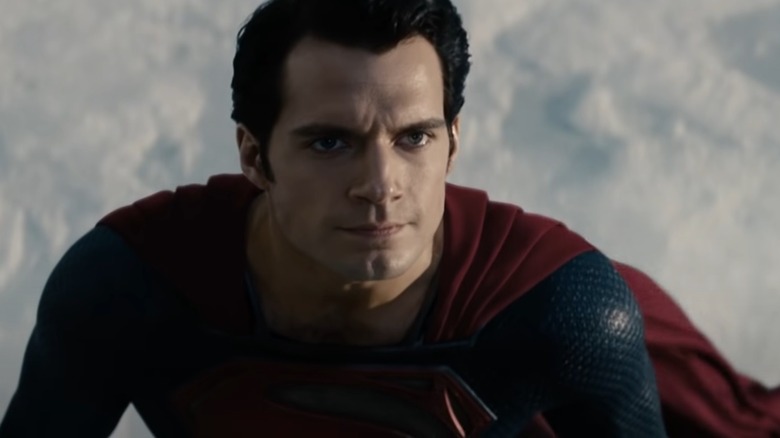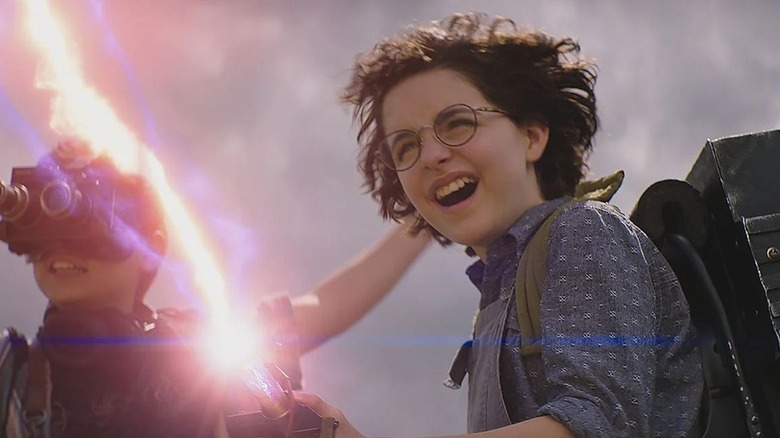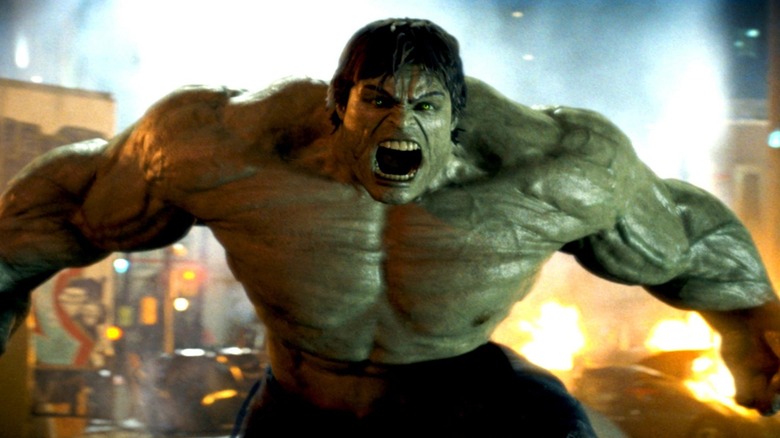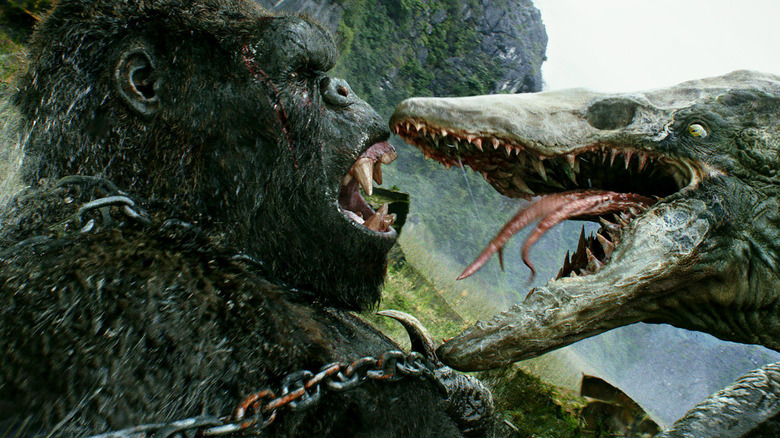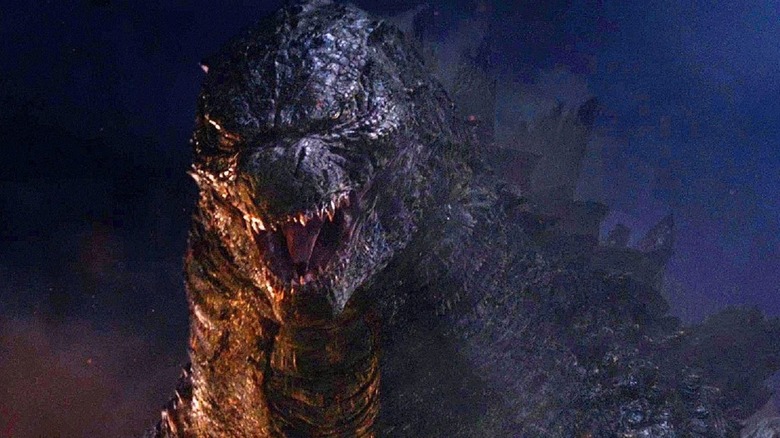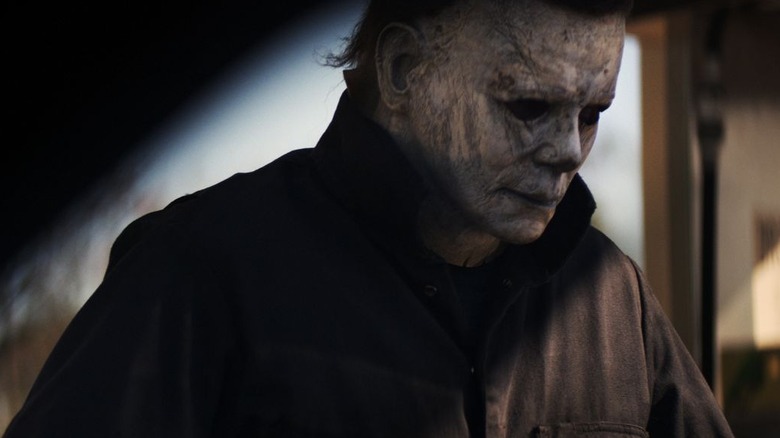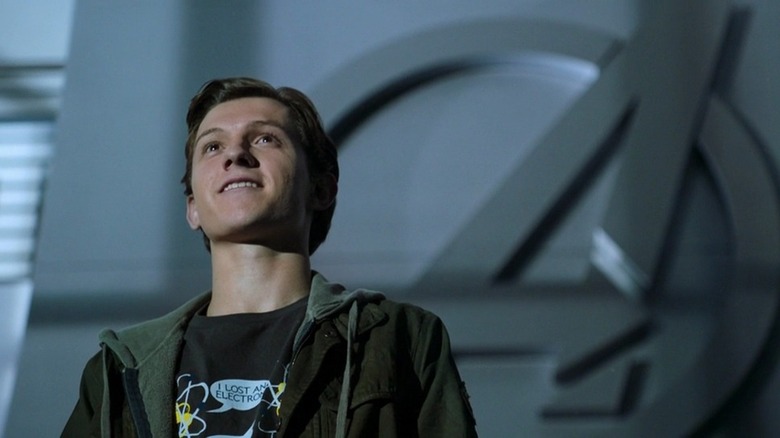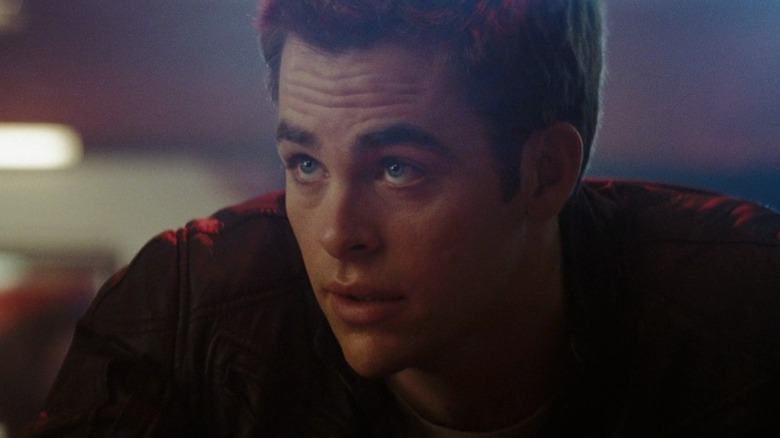Reboots Of Reboots Ranked Worst To Best
What's better than a good idea? A good idea repeated over ... and over ... and over. Okay, so a good idea repeated ad infinitum may not sound so great to us moviegoers, but it certainly does to Hollywood. As long as we keep showing up to the multiplex, they'll keep supplying our cinematic diets with hefty helping of sequels, prequels, and remakes. We live in the intellectual property era, when any property that has a built-in audience (no matter how small) is bound for the blockbuster treatment. And in this cinematic cavalcade of repeats and retreads, the reboot looms very large.
Technically, a reboot is a relaunch of a franchise from scratch (think "Batman Begins"), but increasingly, that definition is becoming too narrow. For example, take "Ghostbusters: Afterlife." It's a reboot of the franchise with a new cast ... but it's also technically a legacy sequel too. To avoid confusion (hopefully), we're defining "reboot" as anytime a studio relaunched a franchise, even if that relaunch was also a sequel. And many times, Hollywood studios have relaunched a franchise more than once. Why? Sometimes to keep printing money from a proven property, other times to give a potential series another shot at glory. Which series succeeded spectacularly, and which franchises failed miserably? Here are reboots of reboots ranked worst to best!
12. The Mummy
Brendan Fraser is having a moment, and we're all about it. Meanwhile, Tom Cruise never stopped having a moment, and we're okay with it, we guess. What do they have in common? An undead phantom from the time of the pharaohs, that's what! In the 2010s, Universal wanted in on the cinematic universe game popularized by Disney's MCU and Warner Brothers' "MonsterVerse," so they searched the archives and settled on an interesting idea — the Universal legacy horror films. Alas, Universal shoehorning their classic horror characters into the ill-conceived Dark Universe was doomed from the get-go. Especially since Abbott and Costello weren't involved, right?
Anyway, the concept was a stretch from the start and unraveled with its first installment — 2017's "The Mummy," starring Cruise. The original 1932 "The Mummy" is a horror classic, but Universal brilliantly relaunched the series in 1999 as an Indiana Jones-esque action film starring Fraser as the dashing Rick O'Connell. While "The Mummy" reboot series fizzled out after four films, the first two movies made enough money to buy King Tut's tomb. The series also launched Dwayne Johnson's movie career and is remembered fondly by millions of millennials who rented it from Blockbuster. Cruise's crack at "The Mummy" isn't fondly remembered by anybody. This confusing horror-action hybrid/shameless Cruise star vehicle has a rating on IMDb that reeks of mediocrity while its horrible critics' and audience scores on Rotten Tomatoes has Imhotep spinning in his tomb.
11. Teenage Mutant Ninja Turtles
There are characters that thrive in a specific era and characters who stand the test of time. The Teenage Mutant Ninja Turtles are ... both? Thanks to toys and TV shows, the teenage terrapins were the biggest pop culture stars of the 1980s not named He-Man, Hulk Hogan, or Michael Jackson. Their dominance was cemented with a 1990 movie that made $202 million on a $13.5 million budget, making it the highest-grossing independent film of all time, at the time. Wild, right?
Alas, the shine was off the shell by the second and third movies, which made $78 million and $42 million respectively. Producers have tried to recapture the '80s magic ever since, on the small and big screens. The Turtles' first cinematic reboot came 14 years later with the animated "TMNT," which was so-so but not spectacular, with $96 million on a $35 million budget. After successfully relaunching another 1980s series, "Transformers," Michael Bay brought his brand of Bayhem to the turtles as producer. While the first film made $485 million on a $125 million budget, the producers neglected to note moviegoers really didn't like it, based on its critics' and audience scores on Rotten Tomatoes. Consequently, the sequel took a "shell-lacking" with viewers and at the box office.
10. Batman v Superman: Dawn of Justice
Despite boasting "Mount Rushmore" characters like Superman and Wonder Woman, for decades, the folks at Warner Bros. have seemed to believe their DC properties consist solely of Batman and his buddies/baddies. In some ways, we can't blame them. Batman is the only character to have broken the opening weekend record four times, more than "Jurassic Park," "The Avengers," and "Star Wars." And when you look at the highest-grossing superhero films ever, there's a whole lotta Batman, which is especially impressive considering his biggest hits happened years ago.
So when "Man of Steel" only made $667 million worldwide, WB turned on the Bat Signal and brought in the Dark Knight for the sequel. Fans were skeptical when Ben Affleck — aka Batfleck — was cast to don the cape and cowl, making him the fifth actor to do so in 27 years (only six actors have played James Bond in the 007 series total). Batman's second reboot in 2016's "Batman v Superman: Dawn of Justice" was maligned by critics, with a horrible Rotten Tomatoes critics' score, while its audience score and IMDb rating signaled a collective "meh" from fans.
9. Saban's Power Rangers
The most powerful force in the pop culture universe is 1990s nostalgia. Feeling old? We'll give you a moment. If you lived through the 1990s, you remember Saban's "Mighty Morphin Power Rangers," arguably the greatest repurposing job in history. Quick backstory: Saban used footage from Japanese series "Super Sentai" for all the awesome fight scenes, shot new footage with American actors on the cheap, and repackaged it as "Mighty Morphin Power Rangers" in 1993, launching one of the most popular brands of the 1990s.
However, audiences are fickle, and children are even more so, so by 1995, "Mighty Morphin Power Rangers: The Movie” underwhelmed with $39 million worldwide, but it still made money thanks to a $13 million budget. While Power Rangers sequels, remakes, and reboots have been a mainstay on TV ever since, Saban tried to reboot the series for the big screen 22 years later with 2017's "Saban's Power Rangers." Despite Elizabeth Banks chewing scenery like it was a sirloin as Rita Repulsa, the grim-dark reboot of the brightly colored children's fantasy missed the mark, with a mediocre IMDb rating and equally lukewarm critics and audience scores on Rotten Tomatoes.
8. Man of Steel
Superman transcends his genre like Sherlock Holmes, Godzilla and Mickey Mouse transcend theirs. So why aren't Superman's movies more popular? Ubiquity doesn't equal popularity. Ironically, Superman's fame undermines his freshness. We've seen this all before, for more than 80 years, so filmmakers have two choices: Give us more of the same (Superman doing Superman-y things) or make Superman "fresh, trendy and modern." Unfortunately, filmmakers have opted for option two.
Richard Donner's "Superman: The Movie" made audiences believe a man could fly in 1978, but filmmakers figured it's sunny optimism wouldn't soar in our cynical age. So for more than a decade Tim Burton, JJ Abrams, McG and others tried and failed to modernize the big blue Boy Scout. Eventually, Bryan Singer convinced WB to spend $200 million on a vague sequel to a 28-year old movie, but he would make it slightly edgy. The result was "Superman Returns," a so-so standalone film but not a franchise relaunch, with only $391 million worldwide.
Inspired by "The Dark Knight" trilogy's success, WB ratcheted up the bleakness seven years later by bringing on Christopher Nolan to produce and Zack Snyder to direct "Man of Steel." While a fair amount of moviegoers dug "Man of Steel," most critics did not, while its $667 million worldwide on a $225 million budget signaled Doomsday for a solo Superman series. Given the rise of earnest entertainment embodied by shows like "Ted Lasso," maybe an optimistic Superman movie could finally fly again. A super-powered Ted Lasso? We'd watch that.
7. Ghostbusters: Afterlife
There are "sure thing," multi-film franchises like "Star Wars" and "Batman." Then there are series best described as "there's no way this movie should've worked, but it did, so let's make sequels." "Ghostbusters" falls in the latter category. The idea of four schlubby dudes launching a business exterminating ghosts should not have worked. But thanks to Bill Murray and Dan Aykroyd being at the peak of their star power, plus a really catchy tie-in song, "Ghostbusters" became a comedy classic and box office hit in 1984, earning $295 million on a $30 million budget. Thus, what should've been a "one-and-done" became a brand, with toys, video games, merchandising tie-ins, and eventually sequels. Alas, the sequels have been the hardest part.
You can't catch lightning in a bottle twice — or in this case Slimer in a Ghost Trap — but "Ghostbusters II" tried, earning stacks of cash but underwhelming critics and fans. The series spent decades in development hell while fans awaited a sequel, up until Sony said "screw it" and relaunched the series from scratch with an all-female crew. The 2016 "Ghostbusters" did so-so with critics, terribly with fans, but it was doomed from the start because of its absurdly high $144 million budget. In 2021, Sony finally gave fans what they wanted with the legacy sequel "Ghostbusters: Afterlife" (and smartly shaved the budget in half to $75 million), earning solid numbers from critics and great numbers from moviegoers.
6. The Incredible Hulk
"You wouldn't like me when I'm angry," Bruce Banner kindly warns his enemies, but based on Hulk's box office results, most moviegoers don't like his solo adventures at all. "The Incredible Hulk" TV series starring Bill Bixby as Bruce, er, David Banner and Lou Ferrigno as the Hulk ran for five successful seasons in the 1970s and early 1980s. However, the big green guy hasn't been nearly as successful on the big screen.
After indie darlings Bryan Singer and Sam Raimi successfully launched "X-Men" and "Spider-Man," Universal hired Taiwanese auteur Ang Lee to direct "Hulk." One problem: Singer and Raimi were fanboys who grew up watching popcorn movies. Lee doesn't have a blockbuster bone in his body. Consequently, Lee's 2003 "Hulk" was less crowd-pleasing and more crowd-depressing, proven by its downright dreadful audience score on Rotten Tomatoes and $245 million worldwide on a $137 million budget.
Five years later Hulk was back for "The Incredible Hulk." With less talking and more action, the film made ... $265 million on a $137 million budget. While critics and audiences liked this one better Hulk's solo adventures weren't smashing anything. Hulk was effectively rebooted again, this time as a sidekick in "The Avengers" ... and it worked! Clearly, Hulk works better as a supporting character than a star, as his highest-grossing movie is his side role in "Thor: Ragnarok" with $850 million worldwide. After being rebooted three times, twice in the same freaking series, the big green guy is finally making green.
5. Kong: Skull Island
King Kong has starred in a cinematic classic, a few great films, and a lot of monkey crap. And that's not even counting the "King Kong" movies that never happened. The 1933 original is, of course, the series' sole masterpiece, with a near-perfect Rotten Tomatoes score. King Kong's legal backstory is almost as compelling and complicated as a journey to Skull Island, but the abridged version is that in the 1970s, Paramount Pictures was able to make a "King Kong" remake, produced by the Italian equivalent of Carl Denham — Dino De Laurentiis. However, critics and moviegoers were mostly underwhelmed with the 1976 film.
Its sequel, "King Kong Lives," fared even worse in 1986. With a low audience score and 0% critics score on Rotten Tomatoes, "King Kong Lives" not only killed the series but is one of the worst movies ever. Despite numerous starts and stops, it would be almost two decades later before Peter Jackson directed his nearly three-hour "King Kong" passion project. The 2005 film wasn't meant to launch sequels, but it satisfied quite a few critics (though moviegoers were less impressed). Over a decade later, Legendary Pictures had the genius idea of merging Godzilla and King Kong into a shared MonsterVerse. "Kong: Skull Island" did away with Jackson's drama and was straight action, pleasing critics and fans.
4. Godzilla
There have been a lot of movies starring Godzilla. Like, maybe more than all of the other movies on this list combined. Consequently, there have been a lot of reboots. In fact, the "Godzilla" series may have invented the reboot with 1984's "The Return of Godzilla," a direct sequel to the 1954 original that ignored the previous 30 years and 14 films. You'd need to be a Godzilla expert to know which film is a sequel to which, so we won't get into the nitty gritty of Toho's OG Japanese series. Instead, we'll focus on the American reboots.
Filmmakers made a few attempts to give Godzilla the American blockbuster treatment in the 1980s and early 1990s, but nothing stuck until Roland Emmerich and Dean Devlin, the dynamic disaster duo behind "Independence Day," got a crack at the big lizard. Okay, no, Godzilla isn't really a big lizard ... but he was in 1998's "Godzilla," which explains why fans have christened the film GINO, or Godzilla in Name Only. Based on its horrendous Rotten Tomatoes scores, you don't have to be a Godzilla fan to hate "Godzilla." Over 15 years later, Legendary Pictures decided to make a Godzilla movie that actually starred Godzilla, resulting in, well, "Godzilla." The movie fared much better with critics and fans and launched the four-film, $1.9 billion MonsterVerse franchise.
3. Halloween
The "Halloween" series has come back more times than Michael Myers stalking his little sister (well, his former little sister). However, there have only been two reboots. First, there was "Halloween: H20" in 1998, which was a sequel to "Halloween II," ignoring the previous three Michael Myers films. Second, there was "Halloween" in 2018, a sequel to the original, which ignored every film except the 1978 flick. "Halloween III: Season of the Witch" is its own thing that doesn't include Michael Myers at all, while Rob Zombie's two "Halloween" movies (2007, 2009) were remakes.
Okay, with all of that out of the way, how do the reboots stack up to the original classic? "Halloween H20" was the best of the sequels up to that point, but it was still pointless. Meanwhile, David Gordon Green's 40 years later "Halloween" boasts the second best Rotten Tomatoes scores of the series, behind only the first film. Even more impressive was its $255 million worldwide gross, which was more than three times the then second highest-grossing film in the series.
2. Spider-Man: Homecoming
Do you even remember a time before "Spider-Man" movies? It's hard to believe that Marvel's world-famous wall-crawler pretty much spent decades in development hell while his DC counterparts, Superman and Batman, banked billions for Warner Bros. All that changed in 2002 when Sam Raimi's "Spider-Man" broke all the records, earning $821 million worldwide, more than $1.2 billion in today's dollars. In the less than 20 years since, there have been 10 solo movies in the Spidey universe (including spinoff series "Venom"), broken into five different franchises, with three separate actors donning the blue-and-red tights. And that's not even including Spider-Man's inclusion in "Captain America: Civil War" and two "Avengers" movies.
What Batman is to Warner Bros., Spider-Man is to Sony — part bankable brand character, part security blanket. After Tobey Maguire hung up the tights in Raimi's "Spider-Man 3" in 2007, Sony brought the character back with Andrew Garfield just five years later in "The Amazing Spider-Man." While that film and its sequel made more than $700 million worldwide, there was a clear lack of enthusiasm from fans and critics, as well as a lack of direction from Sony. Seeing the writing on the wall, Sony made a deal with Disney to bring Marvel's most famous character into the Marvel Cinematic Universe. The result was Tom Holland starring in one of the very best films in the series, which also featured the best gross since "Spider-Man 3."
1. Star Trek
"Star Trek" started on the small screen in 1966, made its way to the big screen in 1979, and became a multi-media franchise that was interconnecting universes when Marvel was still in its proverbial diapers. While "Star Trek: The Motion Picture" was a sequel/continuation of the TV series (continuing a trend that lasted decades), it rebooted the franchise, resulting in five more films featuring the original crew and four featuring the "Next Generation" crew. However, a changing of the guard was clearly in order when "Star Trek: Nemesis" only earned $67 million worldwide on a $60 million budget in 2002.
Following that film's financial failure, Paramount boldly did something they really hadn't done before — take "Star Trek" backward. Or at least sideways. By that point, "Star Trek" had always been spinoffs and sequels following the same timeline as the original series. Now, Paramount was going to reboot the series from scratch, telling the story of Kirk, Spock, and the gang in a whole new franchise (that still managed to tie itself back into the original because this is "Star Trek," after all). It was an easy decision for the studio but a bit of a gamble given notoriously fickle Trekkies. However, it paid off. Under J.J. Abrams' vision, 2009's "Star Trek" reboot earned the best reviews of the entire franchise, as well as the series' second biggest worldwide gross.
